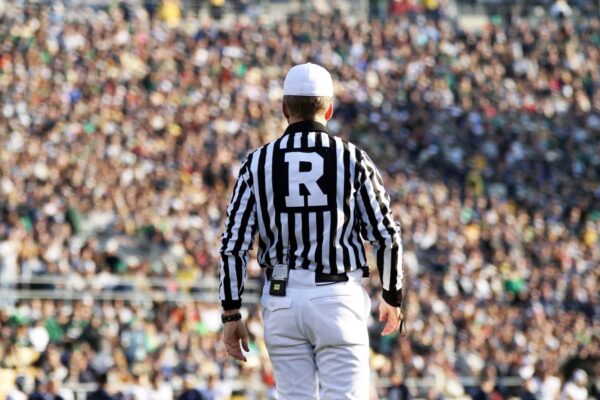In the fast-paced world of sports, a referee’s ability to make accurate decisions in an instant is crucial. Every call carries the potential to shift the momentum of the game, affecting players, coaches, and fans alike. For Edward Munday, years spent officiating on the field have highlighted the importance of these rapid judgments, a skill set that extends well beyond sports and into everyday life. The decision-making abilities honed through refereeing provide a blueprint for navigating challenges and opportunities with clarity and confidence.
The Weight of Immediate Choices
The essence of refereeing lies in making split-second judgments. When the ball moves quickly or tensions escalate among players, there is little time for deliberation. A referee must process information, interpret the rules, and apply them in real-time. This requires not only a thorough understanding of the game but also an acute awareness of context and human behavior.
Translating this skill to daily life, the ability to make quick yet sound decisions becomes an invaluable asset. Whether resolving conflicts at work, managing personal relationships, or responding to unexpected challenges, the agility of thought developed on the field serves as a powerful tool. The stakes may differ, but the principles remain the same: gather information, trust your instincts, and act with conviction.
Trusting Instincts While Managing Uncertainty
One of the defining traits of a successful referee is the ability to trust their instincts. With years of experience, Edward Munday has learned to rely on his intuition when the game demands immediate action. Instinct, however, is not an innate quality; it is cultivated through preparation, practice, and reflection. By immersing oneself in the rules and rhythms of the game, a referee builds a mental framework that supports confident decision-making.
In everyday life, this principle holds true. Trusting instincts does not mean acting impulsively but rather drawing upon a foundation of knowledge and experience. Whether choosing a career path or deciding how to address a pressing issue, the same skillset applies. By staying prepared and reflective, individuals can develop the confidence to make decisions quickly and effectively, even in uncertain situations.
Handling Pressure with Composure
The pressure on referees during a high-stakes game is immense. Every decision is scrutinized by players, coaches, and spectators, often in real time. Yet, maintaining composure under such intense conditions is vital to ensuring fair play and maintaining the integrity of the game. Edward Munday’s ability to stay calm in these moments is a testament to the mental fortitude developed through years of officiating.
This composure is equally valuable off the field. Life frequently presents scenarios where pressure mounts, whether during critical negotiations or in moments of personal crisis. Learning to manage emotions, focus on the task at hand, and maintain clarity in decision-making is a skill that can transform how challenges are approached. By channeling the calm demeanor required in refereeing, individuals can tackle high-pressure situations with confidence and grace.
The Balance of Fairness and Objectivity
Referees must not only make decisions quickly but also ensure they are fair and unbiased. This delicate balance requires both empathy and objectivity, a combination that fosters trust among players and coaches. For Edward Munday, the ability to apply the rules consistently, regardless of external influences, has been a cornerstone of his success as a referee.
In life, fairness and objectivity are equally important when making decisions. Whether mediating conflicts or determining the best course of action in a complex situation, the ability to consider all perspectives and act impartially builds trust and strengthens relationships. The lessons learned on the field translate seamlessly into interpersonal dynamics, demonstrating how fairness and objectivity can guide effective decision-making.
Learning from Mistakes
Even the most experienced referees make mistakes. The fast pace of the game and the complexity of certain situations mean that errors are inevitable. For Edward Munday, acknowledging mistakes and learning from them has been a critical aspect of growth. Rather than dwelling on errors, he focuses on analyzing what went wrong and implementing strategies to improve in future games.
This mindset is invaluable in life. Mistakes, while often uncomfortable, are opportunities for growth and self-improvement. By embracing a reflective approach, individuals can turn missteps into valuable lessons that enhance their decision-making abilities. The resilience to move forward with confidence, even after making an error, is a quality that distinguishes effective leaders and problem-solvers.
The Ripple Effect of Decisions
A referee’s decisions, while made in seconds, have lasting consequences. They influence the dynamics of the game, the morale of the players, and the perceptions of the audience. This awareness of the ripple effect of decisions instills a sense of responsibility and thoughtfulness. Edward Munday understands that every call, no matter how small, carries weight and must be approached with care.
In life, decisions often have similar ripple effects. Choosing a course of action in one area can influence outcomes in unexpected ways. Recognizing the interconnectedness of decisions fosters a thoughtful and deliberate approach, ensuring that actions align with broader goals and values. The lessons learned from refereeing remind us that even small choices can have a significant impact, both immediately and over time.
Decision-Making as a Lifelong Skill
Refereeing is not just a profession; it is a training ground for decision-making that extends into all aspects of life. Edward Munday’s experiences on the field demonstrate how the ability to assess situations quickly, remain composed under pressure, and act with fairness and integrity can be applied universally. These skills, developed through years of officiating, offer a framework for navigating life’s challenges with confidence and clarity.
Ultimately, the lessons learned from refereeing go beyond the rules of the game. They teach us about the importance of preparation, the value of resilience, and the impact of thoughtful action. Whether on the field or in the complexities of daily life, the ability to make split-second judgments is a skill that shapes not only outcomes but also the character of those who practice it.
